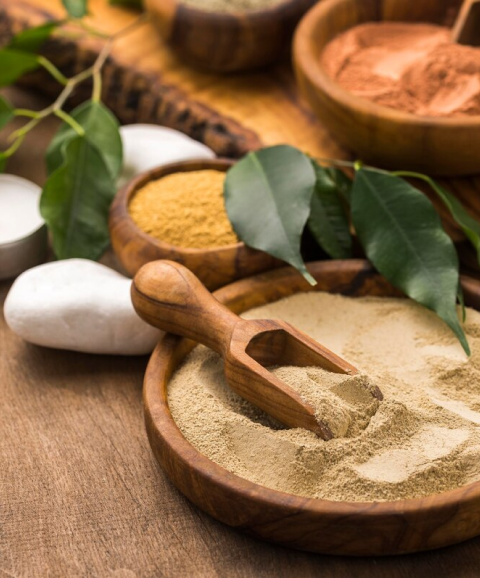
Introduction
Ayurveda—have you heard of it? This ancient system of medicine, originating in India over 5,000 years ago, offers a holistic approach to health and well-being. But what makes Ayurveda so special, and why is it still relevant today? In a world where modern medicine often focuses on treating symptoms, Ayurveda seeks to address the root cause of illness by balancing the mind, body, and spirit. It’s a journey back to nature, where wellness isn’t just about being disease-free but thriving in every aspect of life.
The Principles of Ayurveda

Understanding the Five Elements (Pancha Mahabhutas)
In Ayurveda, everything in the universe, including our bodies, is composed of five elements: Earth, Water, Fire, Air, and Ether (Space). These elements combine in different ways to form the three doshas, or energies, that govern our physical and mental processes. Understanding these elements helps us connect with the world around us and maintain harmony within ourselves.
The Three Doshas: Vata, Pitta, Kapha
The three doshas—Vata, Pitta, and Kapha—are the cornerstone of Ayurvedic medicine. Each dosha represents a combination of two elements and governs specific bodily functions. For instance, Vata (Air and Ether) controls movement and communication, Pitta (Fire and Water) oversees digestion and metabolism, and Kapha (Earth and Water) is responsible for structure and stability. Your unique balance of these doshas determines your physical and mental characteristics, as well as your predisposition to certain health conditions.
The Concept of Balance in Ayurveda
Ayurveda teaches that health is a state of balance between the doshas, your environment, and your lifestyle. Imbalance in the doshas, often caused by stress, poor diet, or environmental factors, can lead to illness. Ayurveda provides tools and practices to restore this balance, ensuring long-term health and well-being.
Ayurvedic Practices for Daily Life

Dinacharya: The Ayurvedic Daily Routine
Imagine starting your day with a sense of purpose and calm. Dinacharya, or the Ayurvedic daily routine, is designed to align your body with the natural rhythms of the day. This might include waking up early, practicing mindfulness, eating meals at regular intervals, and winding down before bedtime. These practices help regulate your doshas and create a foundation for overall wellness.
Ritucharya: Adapting to the Seasons
Just as nature changes with the seasons, so should our lifestyle and diet. Ritucharya, the seasonal regimen in Ayurveda, emphasizes the importance of adjusting our habits to maintain balance. For example, during the cold, dry winter months, you might focus on warming, nourishing foods to balance the Vata dosha, while in the hot summer, cooling and hydrating practices help manage Pitta.
The Role of Diet in Ayurveda
“You are what you eat” takes on a deeper meaning in Ayurveda. Your diet is considered a powerful tool for maintaining health and preventing disease. Ayurveda recommends a diet tailored to your dosha, with an emphasis on fresh, seasonal, and easily digestible foods. Mindful eating, where you pay attention to your food and how it makes you feel, is also a key component of Ayurvedic nutrition.
Ayurvedic Treatments and Therapies

Panchakarma: The Detoxification Process
Feeling sluggish or out of sync? Panchakarma might be the answer. This traditional Ayurvedic detoxification therapy involves five procedures designed to cleanse the body of toxins, balance the doshas, and restore natural health. It’s like hitting the reset button for your body and mind, often involving treatments like oil massages, steam baths, and herbal remedies.
Herbal Medicine in Ayurveda
Plants have always been our allies in health. Ayurvedic herbal medicine uses the healing properties of plants to treat a wide range of conditions, from digestive issues to mental health concerns. Herbs like Ashwagandha, Turmeric, and Triphala are just a few examples of the potent remedies used in Ayurveda to restore balance and promote wellness.
Ayurvedic Massage and Therapies
Ayurvedic massage, or Abhyanga, is more than just a way to relax. It’s a therapeutic practice that uses warm herbal oils to nourish the skin, improve circulation, and calm the nervous system. Alongside other therapies like Shirodhara (a soothing flow of oil on the forehead) and Swedana (herbal steam therapy), these treatments work to rejuvenate the body and mind.
Ayurveda and Modern Science

The Scientific Validation of Ayurvedic Practices
For years, Ayurveda was seen as a purely traditional practice, but recent scientific studies have begun to validate its effectiveness. Research has shown that Ayurvedic treatments can be beneficial in managing chronic conditions like diabetes, arthritis, and mental health disorders. This growing body of evidence is helping bridge the gap between ancient wisdom and modern medicine.
Integrating Ayurveda with Modern Medicine
One of the strengths of Ayurveda is its adaptability. It can be integrated with modern medical practices to provide a more holistic approach to healthcare. For instance, Ayurvedic therapies can complement conventional treatments by reducing side effects, improving recovery times, and enhancing overall well-being. This integrative approach is becoming increasingly popular in wellness centers and hospitals around the world.
Success Stories of Ayurvedic Treatments
Countless individuals have turned to Ayurveda for relief from chronic conditions and have found success where other treatments failed. From managing autoimmune disorders to improving mental health, Ayurveda offers a natural, personalized approach to healing that resonates with those seeking alternatives to conventional medicine.
Ayurveda in Mental Wellness

Ayurvedic Approaches to Mental Health
Mental health is a critical component of overall well-being, and Ayurveda offers unique insights into managing it. According to Ayurveda, mental health is influenced by the balance of the doshas and the state of the mind (sattva, rajas, and tamas). Ayurvedic practices such as meditation, yoga, and herbal therapies can help balance these elements, promoting mental clarity and emotional stability.
Meditation and Yoga in Ayurveda
Meditation and yoga are integral parts of Ayurveda, offering tools to calm the mind, reduce stress, and enhance self-awareness. Regular practice of these disciplines not only supports mental health but also contributes to physical well-being by improving flexibility, strength, and circulation.
Herbal Remedies for Stress and Anxiety
In a world filled with stressors, Ayurveda provides natural remedies to help manage anxiety and stress. Herbs like Brahmi, Ashwagandha, and Jatamansi are known for their calming properties and are often used in Ayurvedic treatments to support mental health and resilience.
The Global Impact of Ayurveda

Ayurveda’s Influence on Global Wellness Trends
From yoga studios to wellness retreats, the principles of Ayurveda are spreading across the globe. The rise of holistic health practices, organic diets, and mindfulness can all be traced back to Ayurvedic teachings. This ancient wisdom is influencing modern wellness trends, encouraging people to embrace a more balanced and natural approach to health.
The Rise of Ayurvedic Products in the Global Market
Ayurveda’s popularity has led to a surge in Ayurvedic products, from skincare to supplements. These products, often made with natural ingredients and based on traditional formulations, are gaining recognition for their effectiveness and sustainability. The global market is embracing Ayurveda, with consumers seeking products that align with their desire for holistic and eco-friendly options.
Ayurveda in the Modern Lifestyle
Incorporating Ayurveda into a busy, modern lifestyle might seem challenging, but it’s more accessible than you think. Simple practices like mindful eating, regular exercise, and stress management can make a significant difference. As more people discover the benefits of Ayurveda, it’s becoming a go-to for those looking to enhance their quality of life naturally.
How to Incorporate Ayurveda into Your Life

Simple Ayurvedic Practices for Beginners
Starting with Ayurveda doesn’t require a complete lifestyle overhaul. Small changes, such as drinking warm water in the morning, eating according to your dosha, and practicing mindfulness, can have a profound impact on your well-being. These simple steps can help you start your journey towards a more balanced life.
Adapting Ayurvedic Diet Principles
Your diet is a reflection of your health. Ayurveda encourages you to eat according to your dosha and the seasons, focusing on whole, fresh foods that are easy to digest. By listening to your body and making mindful food choices, you can support your digestion, energy levels, and overall health.
Balancing Your Doshas with Lifestyle Changes
Understanding your dosha and how it influences your health is key to applying Ayurvedic principles in your life. By making lifestyle changes that balance your doshas—such as adjusting your sleep schedule, managing stress, and choosing the right exercise—you can maintain harmony and prevent illness.
Challenges and Misconceptions about Ayurveda

Common Myths about Ayurveda
Despite its growing popularity, Ayurveda is often misunderstood. Some believe it’s just about herbal remedies, while others see it as a replacement for modern medicine. However, Ayurveda is a comprehensive system that addresses all aspects of health. Understanding its true nature helps dispel these myths and allows more people to benefit from its wisdom.
The Challenge of Standardization in Ayurvedic Medicine
One of the biggest challenges Ayurveda faces today is the lack of standardization. With its reliance on natural ingredients and personalized treatments, creating uniform standards can be difficult. However, efforts are being made to regulate the industry to ensure quality and safety, which will help build trust and expand Ayurveda’s reach.
Navigating the Commercialization of Ayurveda
As Ayurveda becomes more popular, there’s a risk of it being commercialized in ways that stray from its original principles. It’s important to approach Ayurvedic products and services with discernment, choosing those that stay true to the tradition’s holistic and ethical values.
Conclusion
Ayurveda’s journey from ancient wisdom to modern wellness is a testament to its timeless relevance. By focusing on balance, prevention, and a holistic approach to health, Ayurveda offers solutions that resonate in today’s fast-paced world. Whether you’re seeking to improve your physical health, mental well-being, or overall quality of life, Ayurveda provides a pathway to harmony and vitality.
Frequently Asked Questions about Ayurveda
Ayurveda is based on the principle of balance—balancing the body, mind, and environment to maintain health and prevent disease.
You can determine your dosha by consulting an Ayurvedic practitioner or taking a detailed online quiz that assesses your physical and mental characteristics.
Ayurveda can be effective for managing chronic illnesses, especially when integrated with modern medical treatments, by addressing the root causes and promoting overall health.
Yes, Ayurveda can complement other medical systems, providing a holistic approach to treatment that addresses both symptoms and underlying imbalances.
Start with simple practices like eating according to your dosha, following a daily routine (Dinacharya), and incorporating mindfulness and yoga into your life.






